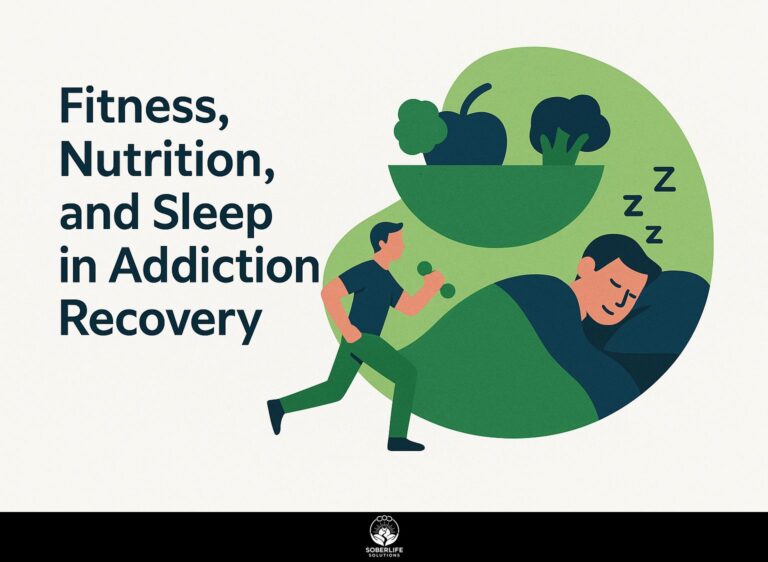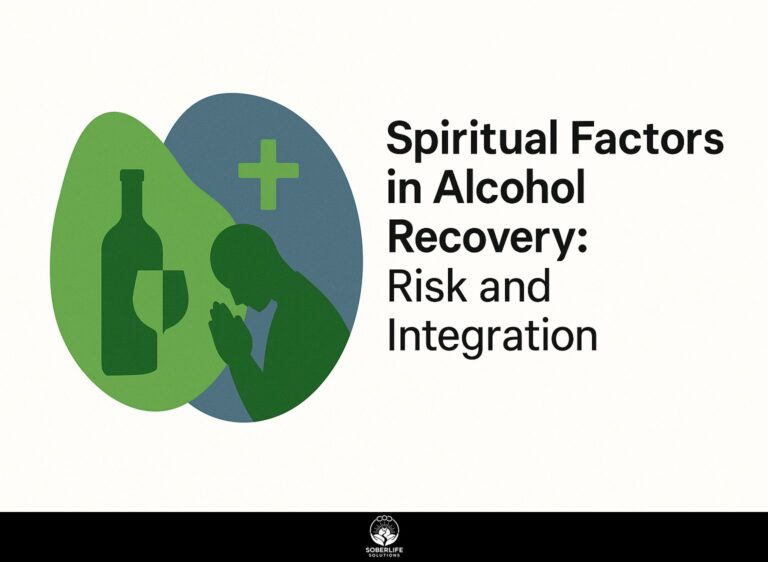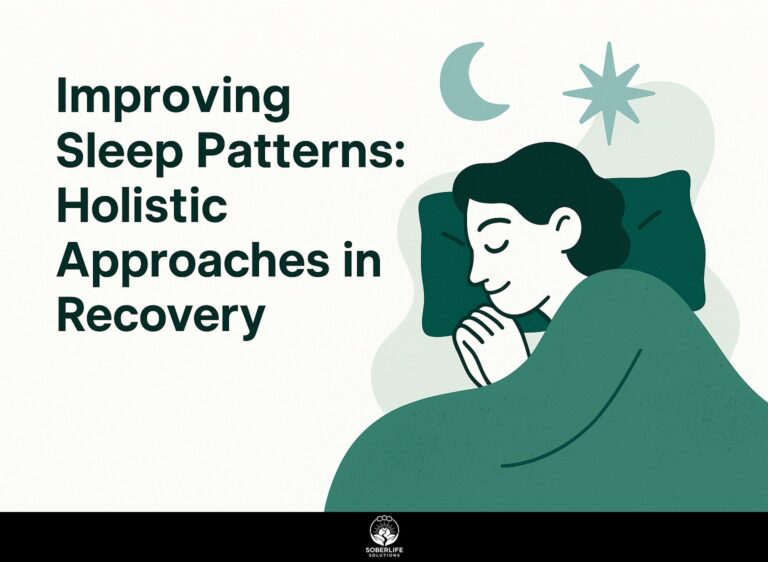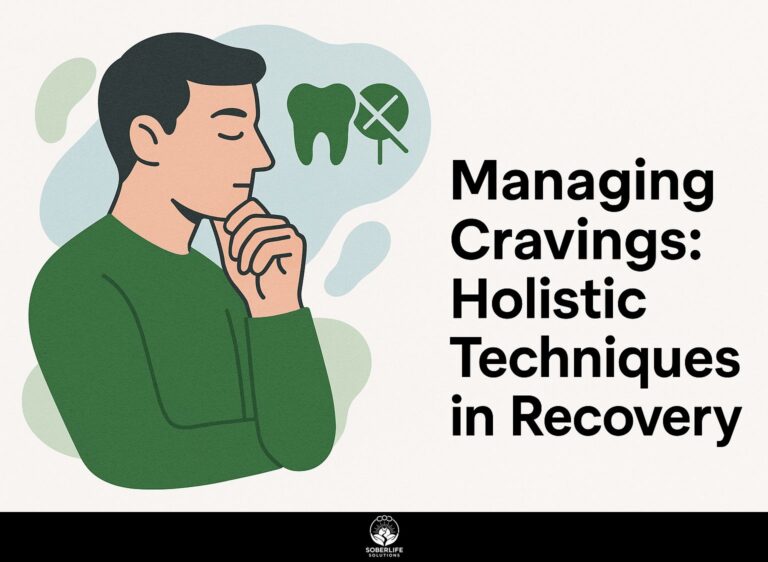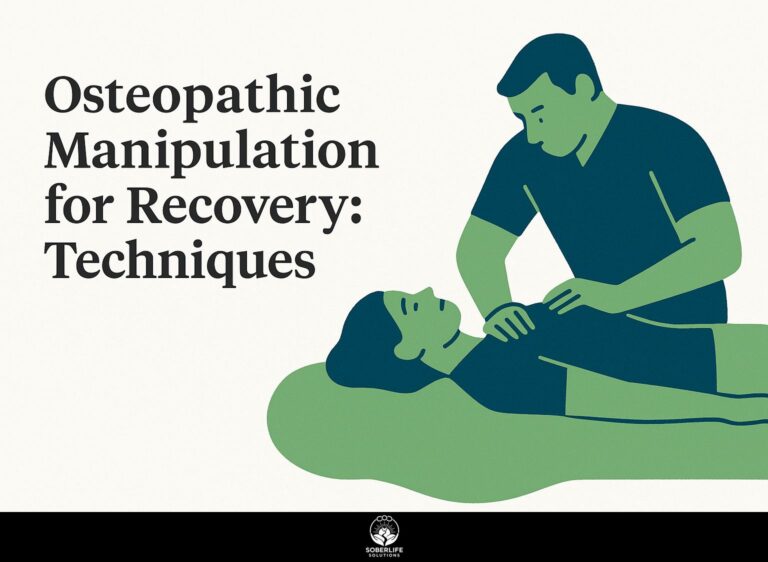Comprehensive Support in Recovery: Approaches and Benefits
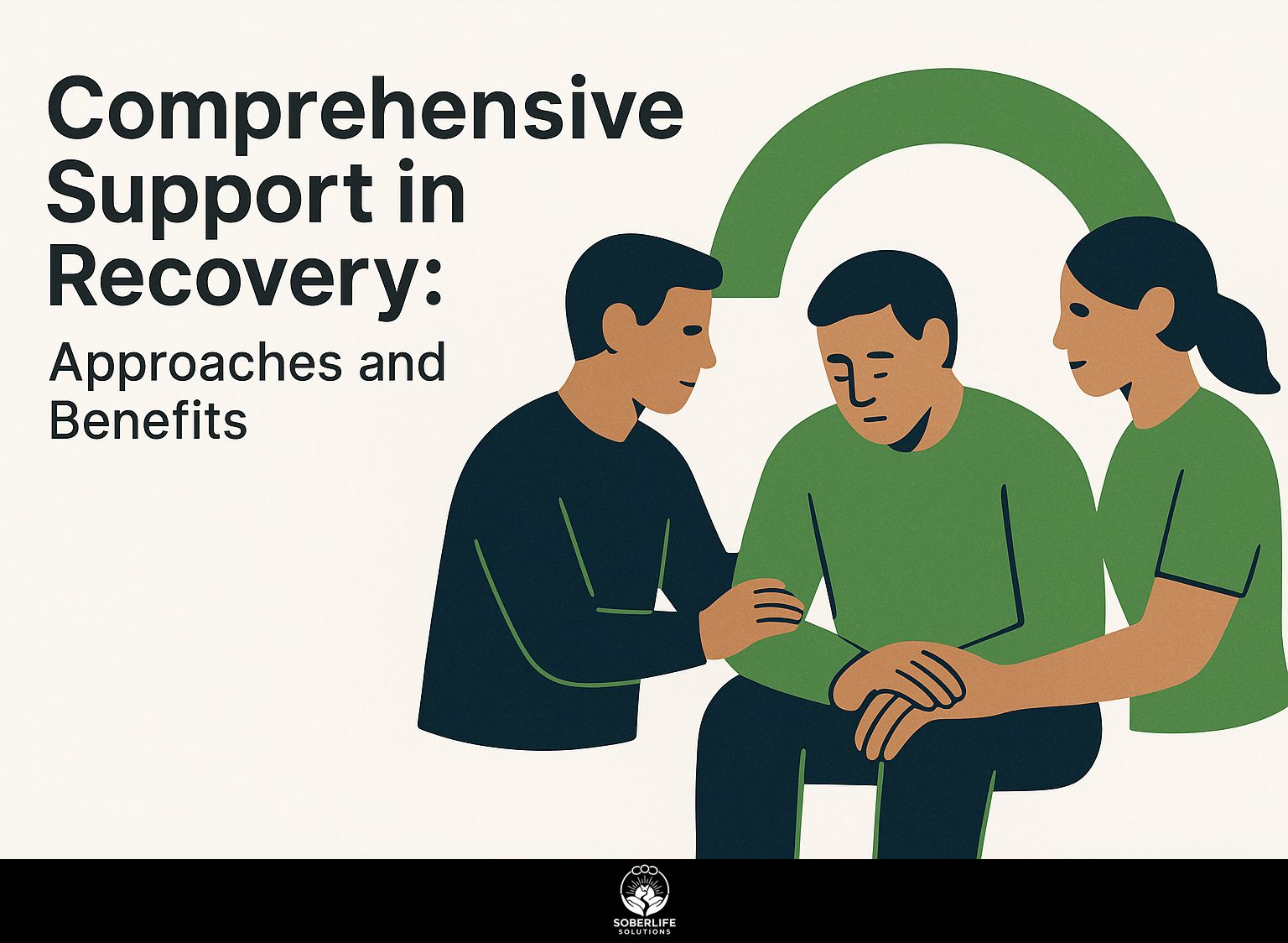
Recovering from substance use disorder involves many aspects, where full support is very important. Effective addiction treatment deals with physical problems and improves mental health healing using methods like peer support and recovery management. This article looks at different support strategies, their benefits, and how they can help people on their path to sobriety, offering useful information for those looking for a more rewarding recovery experience.
Key Takeaways:
Understanding Recovery
Recovery involves dealing with the emotional, physical, and social aspects of getting over substance use disorder.
To improve recovery, consider including behavioral health methods like cognitive-behavioral therapy (CBT). This approach helps people change negative thinking patterns, as detailed in ScienceDirect’s exploration of mechanisms underlying CBT.
Peer support groups, such as Alcoholics Anonymous (AA) or Narcotics Anonymous (NA), are essential because they offer shared experiences and hold members responsible.
Incorporating supportive housing services can create a stable environment conducive to recovery.
SAMHSA focuses on knowing things completely and pushes people to find what they are good at and ask for help from those around them, resulting in continuous progress and better health.
Types of Support Approaches
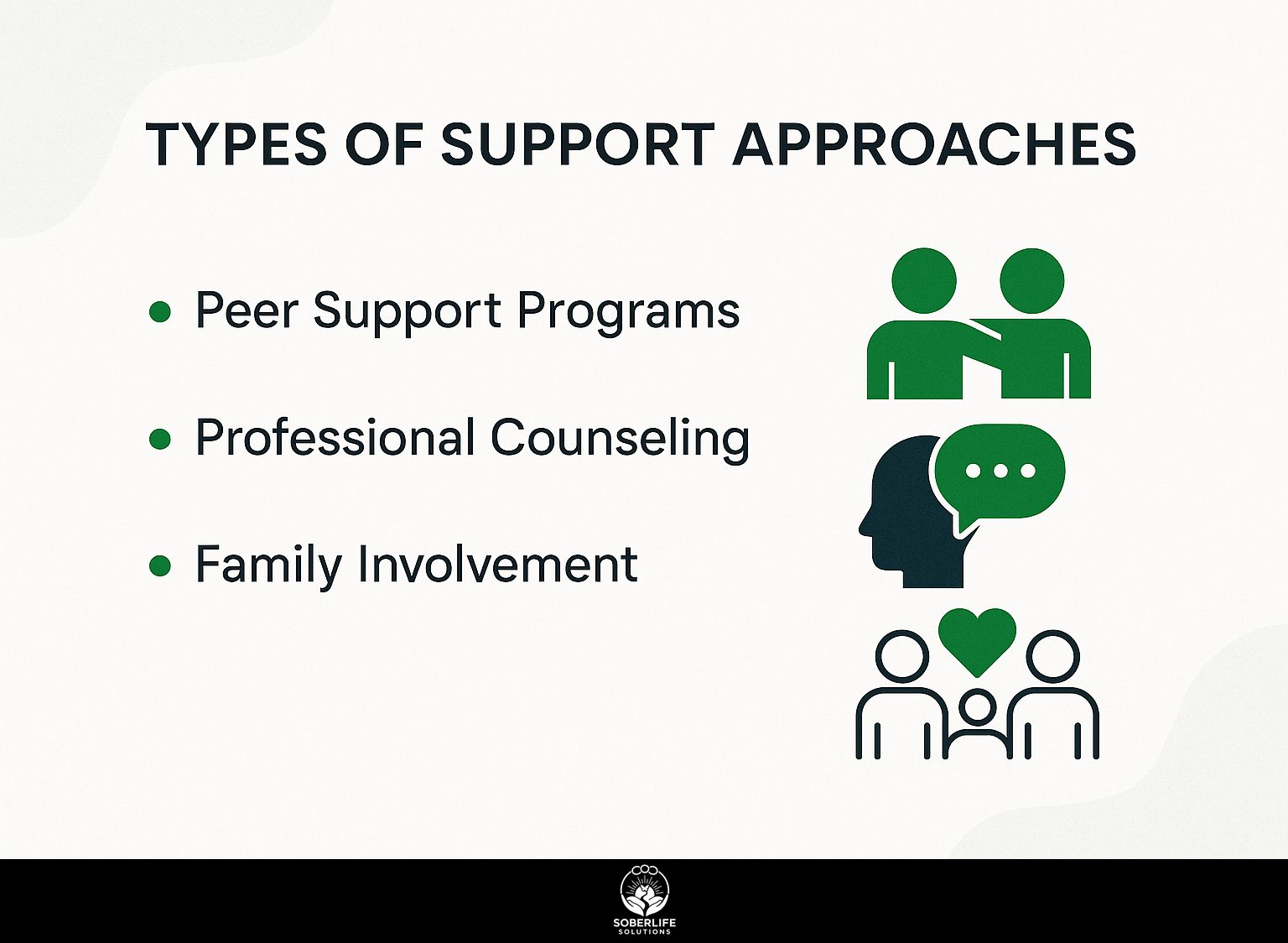
Different types of help focus on the unique needs of people in recovery, guiding them with individualized plans. For an extensive analysis of this trend, our comprehensive study of cognitive restructuring techniques examines effective strategies for recovery.
Peer Support Programs
Programs like Alcoholics Anonymous provide important help through shared stories and support.
These programs provide a supportive setting that helps people feel less alone during recovery. Metrics from randomized controlled trials indicate that participants often report a 20% increase in self-efficacy and a 30% reduction in relapse rates within the first year.
Joining group talks and mentorship helps with responsibility and creates a feeling of connection, which is important for long-term recovery. By using these helpful groups, people gain strength from common goals, greatly improving their recovery process. Recent findings by the Substance Abuse and Mental Health Services Administration (SAMHSA) highlight how peer support is instrumental in recovery from substance use disorders.
Professional Counseling
Professional counseling services, including cognitive-behavioral therapy, play a critical role in addressing underlying issues of addiction for sustained recovery.
Research indicates that professional counseling can improve recovery outcomes significantly, with some studies showing success rates upwards of 60% when integrated with therapeutic communities.
For instance, the combination of group therapy and individual counseling creates a supportive environment critical for healing. Programs like the Matrix Model and Motivational Interviewing increase participation and responsibility, supporting lasting recovery.
Including these services in treatment plans helps tackle addiction and also teaches important life skills, improving general well-being. An exploration of the roles and impact of addiction counselors can offer further insight into the vital services provided during addiction recovery. For those interested in a comprehensive overview, this article by the American Psychological Association discusses innovative approaches psychologists are using to address substance use.
Family Involvement
Family involvement is key to creating a supportive atmosphere that improves participation in treatment and recovery results.
Strategies to involve families in the recovery process include structured family therapy sessions and educational programs. For instance, weekly family therapy can help all members express feelings and set boundaries, as demonstrated in a case study where increased communication led to significant improvement in the patient’s attitude towards recovery.
Educational programs that inform families about addiction and recovery can arm them with tools to support their loved ones effectively. Programs like Al-Anon provide helpful resources and a community, maximizing the positive impact of family involvement.
Benefits of Comprehensive Support
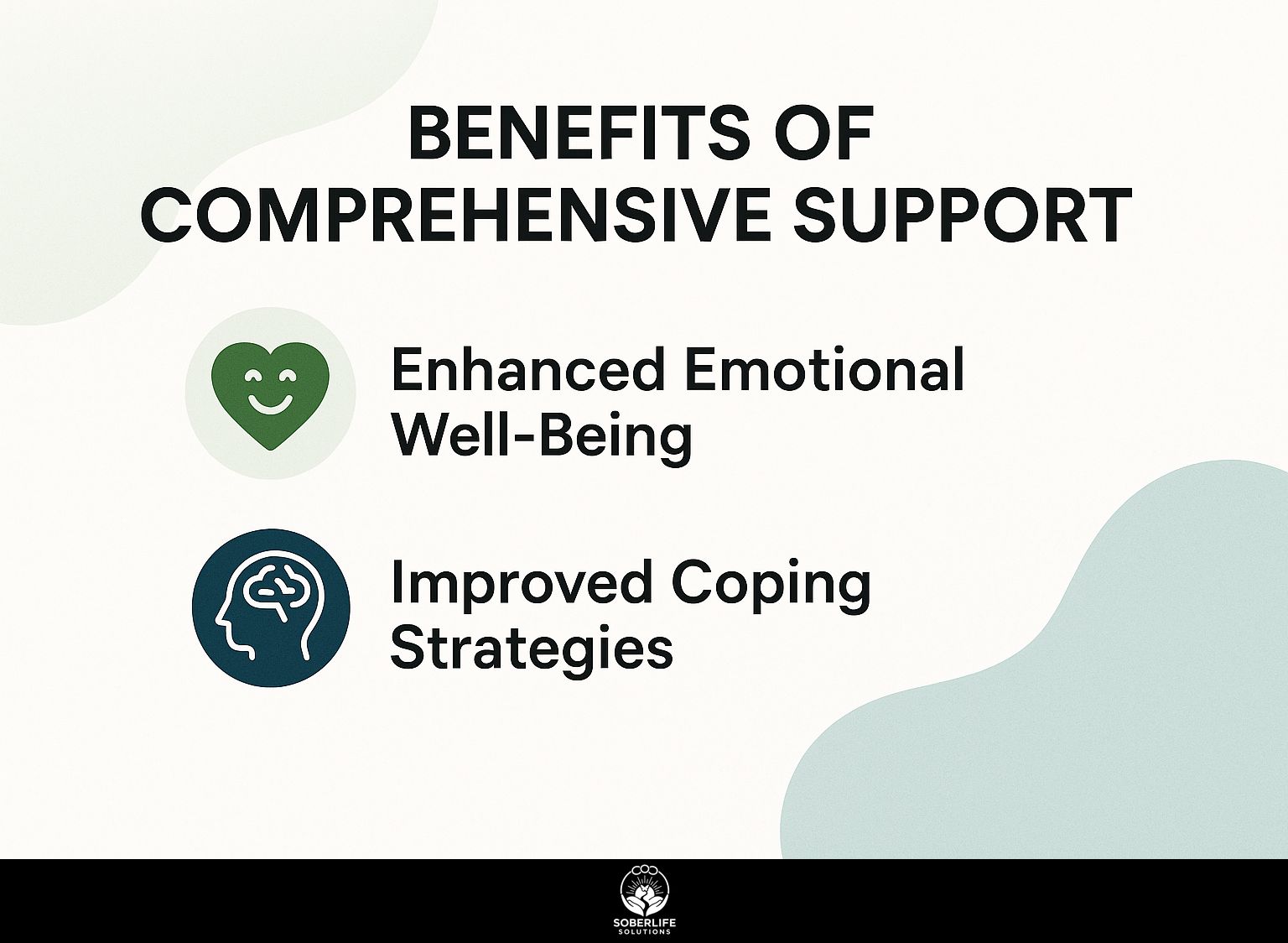
Strong support systems can greatly improve emotional health and give people useful ways to manage stress. Related insight: Integrative therapies in addiction recovery offer additional benefits and methods that enhance these support systems.
Enhanced Emotional Well-Being
Support systems have been shown to improve emotional well-being, with studies indicating a 30% increase in self-efficacy among participants in peer support groups.
To improve recovery results, it’s important to use certain support methods.
- For example, regular check-ins using platforms like Zoom can help build stronger relationships among group members.
- Giving people tools like mental health apps-such as Headspace for mindfulness or Moodfit for tracking emotions-can help them in their recovery process. In one study, participants who used these tools said their anxiety levels dropped by 25%.
- Combining help from friends with easy-to-use online tools can greatly improve mental health.
Improved Coping Strategies
Participants in structured support groups report a 40% improvement in developing effective coping strategies for managing cravings and triggers.
Techniques taught in these sessions often include mindfulness practices and stress management skills.
For instance, mindfulness meditation, which involves focusing on breathing and being present, can significantly reduce anxiety and cravings. Participants also learn cognitive-behavioral strategies to challenge unhelpful thoughts that lead to triggers.
Many groups use breathing exercises, like the 4-7-8 method, which helps to relax the nervous system. By regularly using these strategies, people can strengthen their ability to bounce back and handle stressful situations better.
Integrating Holistic Approaches
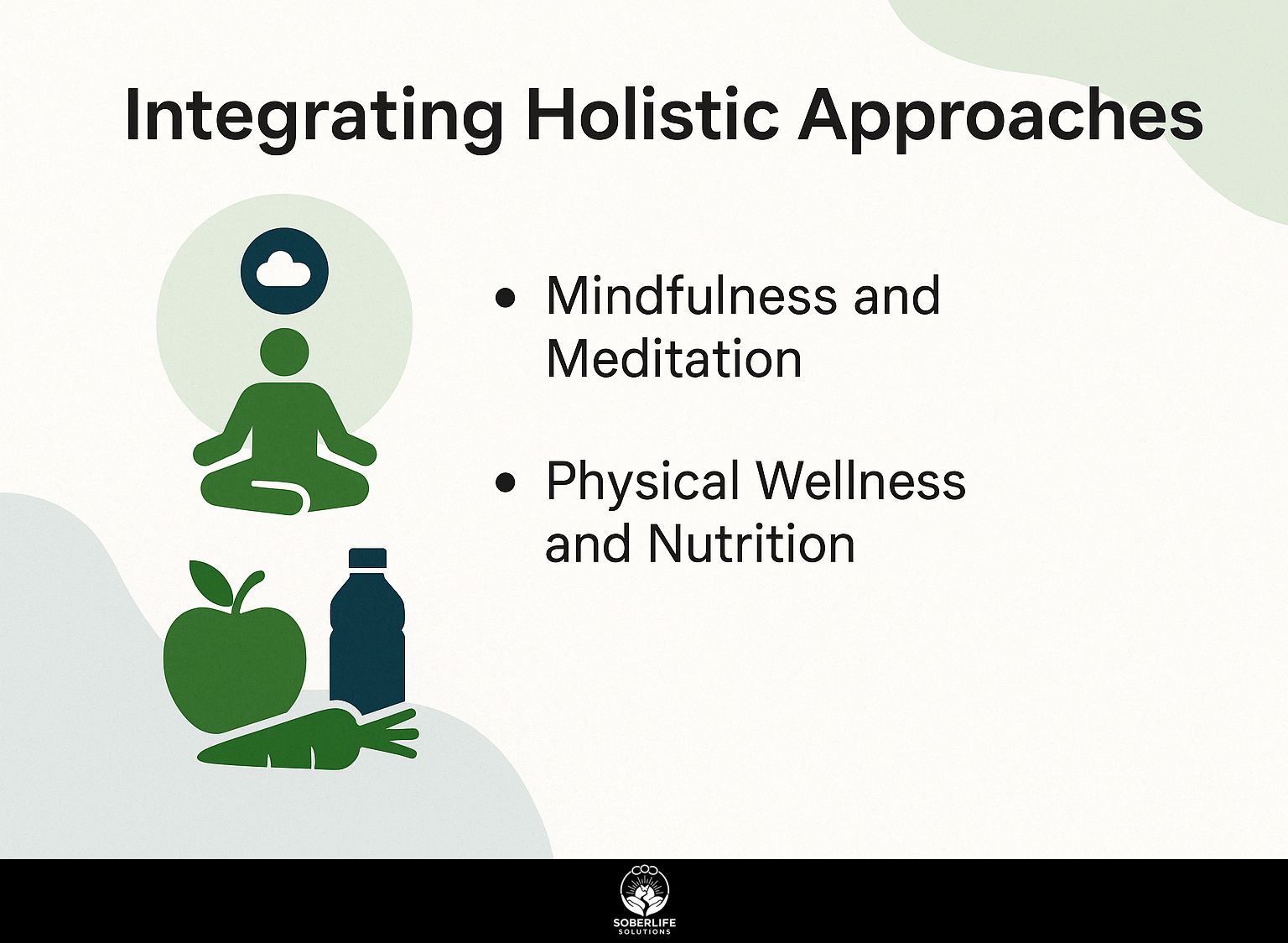
Using thorough methods in recovery support helps a balanced process that addresses both the mental and physical aspects of healing.
Mindfulness and Meditation
Mindfulness and meditation practices can reduce stress and anxiety, with participants reporting up to a 50% reduction in cravings after consistent practice.
Including mindfulness in your daily routine can be easy and beneficial. Begin with only five minutes each morning using an app such as Headspace or Calm, which offer guided sessions designed for beginners.
Consider practicing mindful eating by focusing on your food’s texture and flavor, aiming to eat in silence without distractions. This approach aligns with strategies for changing habits in recovery, where mindful eating can play a crucial role in adjusting lifestyle and eating patterns.
Adding short activities like deep breathing or a quick walk to your daily routine can strengthen your habits and improve your health.
Physical Wellness and Nutrition
A balanced approach to physical health and eating well is important, with studies showing that eating right can improve healing results by up to 20%.
To improve recovery, eat foods rich in nutrients, such as leafy greens, lean meats, and whole grains.
Meal planning can simplify this process; dedicate a couple of hours weekly to prepare healthy snacks and meals in advance.
Incorporating physical activity, such as light yoga or walking for 30 minutes a day, supports both mental and physical well-being.
Consider utilizing apps like MyFitnessPal to track nutrition and progress, ensuring you meet your daily goals.
Being part of a helpful group can inspire and keep you on track with your health goals.
Challenges in Recovery Support
Even with many advantages, recovery support encounters major difficulties that can slow down people’s progress and involvement. Understanding the process and impact of various therapies for recovery can help in navigating these challenges.
Stigma and Misunderstanding
Negative views about addiction often prevent people from asking for help. Research indicates that 60% of people dealing with substance use avoid getting support because they worry about being judged.
To fight this stigma, communities can start many practical efforts.
- Start by organizing workshops focused on education about addiction, emphasizing that it is a medical issue rather than a moral failing.
- Set up peer support groups where people can talk about their experiences in a safe environment, promoting knowledge and empathy.
- Collaborate with local media to promote positive narratives around recovery, showcasing success stories.
- By involving local businesses in awareness campaigns, you can build noticeable support systems, showing that asking for help is brave progress.
Frequently Asked Questions
What does full support in recovery mean?
Complete help in recovery means looking at all parts of a person’s life to support them in dealing with mental health issues, addiction, or other recovery needs. It involves addressing physical, emotional, and psychological factors to promote long-term healing and well-being.
What are some ways to provide thorough help during recovery?
Some typical methods for full support in recovery include therapy, medication, support groups, self-help methods, and changing daily habits. These can be mixed to make an individual and successful recovery plan.
Does getting full help aid in recovery?
Yes, there are many advantages to getting thorough help during recovery. These can lead to better mental and emotional health, more effective ways to handle challenges, closer connections with others, and increased knowledge of personal needs and strengths.
How do I know if I need broad help in getting better?
If you are facing difficulties with mental health, addiction, trauma, or other recovery needs, getting complete support might help. It is also recommended for individuals with a family history of mental health issues or those who have experienced significant life changes or trauma.
Is it possible to get full help for recovery remotely?
Yes, there are plenty of resources available for people to get full support in recovery remotely. This can include virtual therapy sessions, online support groups, and self-help materials. It is important to find a reputable and qualified provider for these services.
How can I find complete help in recovery that matches what I need?
To find thorough help in recovery that suits you, look into various programs and resources. It can also be helpful to consult with a mental health professional who can provide guidance and recommendations for your specific situation. Find a team that offers help and encouragement as you work on getting better.

